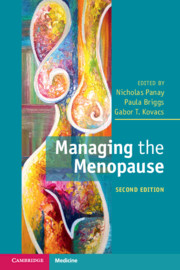Book contents
- Managing the Menopause
- Managing the Menopause
- Copyright page
- Contents
- Contributors
- Foreword
- Chapter 1 Physiology of the Menstrual Cycle and Changes in the Perimenopause
- Chapter 2 Clinical Features of the Menopause/Postmenopause
- Chapter 3 The Ovarian Reserve
- Chapter 4 Premature Ovarian Insufficiency
- Chapter 5 Premature Ovarian Insufficiency
- Chapter 6 Natural Hormone Replacement Therapy after Menopause by Ovarian Tissue Transplantation
- Chapter 7 Migraine in the Menopause
- Chapter 8 Psychological Aspects of the Menopause
- Chapter 9 Memory and Mood in the Menopause
- Chapter 10 Libido and Sexual Function in the Menopause
- Chapter 11 Vulvo-Vaginal Atrophy (VVA)
- Chapter 12 Pelvic Floor, Urinary Problems and the Menopause
- Chapter 13 The Effect of Menopause on the Musculoskeletal System
- Chapter 14 Hormonal Management of Osteoporosis during the Menopause
- Chapter 15 Cardiovascular Disease and the Menopause
- Chapter 16 Gynecological Pathology in the Menopause (Excluding Cancers)
- Chapter 17 Nutrition and Weight Gain in the Menopause
- Chapter 18 The Use of Estrogens and Progestogens in Menopausal Hormone Therapy
- Chapter 19 Androgen Therapy for Postmenopausal Women
- Cahpter 20 Contraception for the Perimenopausal Woman
- Chapter 21 Hormone Therapy and Cancer
- Chapter 22 Menopausal Hormone Therapy (MHT) and Venous Thrombosis
- Chapter 23 The Risk–Benefit Analysis of Menopausal Hormone Therapy in the Menopause
- Chapter 24 Selective Estrogen Receptor Modulators (SERMs) and Menopausal Hormone Therapy (MHT)
- Chapter 25 Non-hormonal Treatments for Menopausal Symptoms
- Chapter 26 Alternative Therapies for the Management of Menopausal Symptoms
- Chapter 27 Menopause in Primary Care
- Index
- References
Chapter 8 - Psychological Aspects of the Menopause
Published online by Cambridge University Press: 18 June 2020
- Managing the Menopause
- Managing the Menopause
- Copyright page
- Contents
- Contributors
- Foreword
- Chapter 1 Physiology of the Menstrual Cycle and Changes in the Perimenopause
- Chapter 2 Clinical Features of the Menopause/Postmenopause
- Chapter 3 The Ovarian Reserve
- Chapter 4 Premature Ovarian Insufficiency
- Chapter 5 Premature Ovarian Insufficiency
- Chapter 6 Natural Hormone Replacement Therapy after Menopause by Ovarian Tissue Transplantation
- Chapter 7 Migraine in the Menopause
- Chapter 8 Psychological Aspects of the Menopause
- Chapter 9 Memory and Mood in the Menopause
- Chapter 10 Libido and Sexual Function in the Menopause
- Chapter 11 Vulvo-Vaginal Atrophy (VVA)
- Chapter 12 Pelvic Floor, Urinary Problems and the Menopause
- Chapter 13 The Effect of Menopause on the Musculoskeletal System
- Chapter 14 Hormonal Management of Osteoporosis during the Menopause
- Chapter 15 Cardiovascular Disease and the Menopause
- Chapter 16 Gynecological Pathology in the Menopause (Excluding Cancers)
- Chapter 17 Nutrition and Weight Gain in the Menopause
- Chapter 18 The Use of Estrogens and Progestogens in Menopausal Hormone Therapy
- Chapter 19 Androgen Therapy for Postmenopausal Women
- Cahpter 20 Contraception for the Perimenopausal Woman
- Chapter 21 Hormone Therapy and Cancer
- Chapter 22 Menopausal Hormone Therapy (MHT) and Venous Thrombosis
- Chapter 23 The Risk–Benefit Analysis of Menopausal Hormone Therapy in the Menopause
- Chapter 24 Selective Estrogen Receptor Modulators (SERMs) and Menopausal Hormone Therapy (MHT)
- Chapter 25 Non-hormonal Treatments for Menopausal Symptoms
- Chapter 26 Alternative Therapies for the Management of Menopausal Symptoms
- Chapter 27 Menopause in Primary Care
- Index
- References
Summary
The menopause – the last menstrual period – takes place within a gradual process of physiological change, but also concurrently with age and developmental changes, and within varied psychosocial and cultural contexts. Psychological perspectives on menopause include the meanings of menopause, appraisals and attributions of symptoms to menopause, as well as cognitive, affective and behavioural reactions to the menopause. Assessment and psychological interventions will be described with particular reference to depression, anxiety, sleep and vasomotor symptoms – hot flushes and night sweats.
- Type
- Chapter
- Information
- Managing the Menopause , pp. 76 - 85Publisher: Cambridge University PressPrint publication year: 2020



